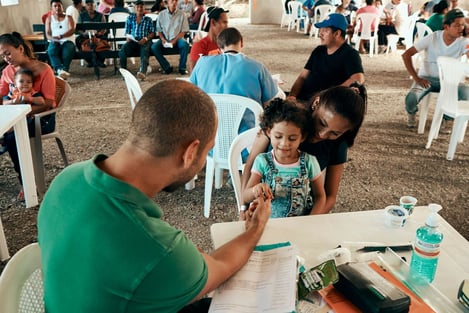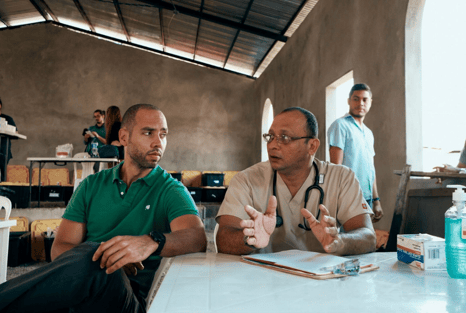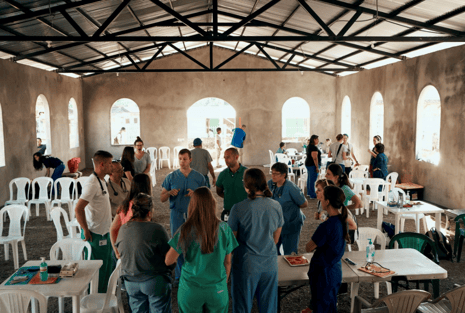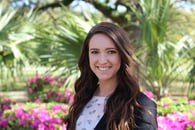"You’re doing the same thing all the time and then you go somewhere completely different. You come back and a lot of the run-of-the-mill stuff you get tired of, you get excited for again. It was nice to have a quiet exam room again to hear everything I need. But at the same time, you miss that open air environment, you miss having colleagues literally right next to you. It picked my spirits up a good bit and got me excited about what I’m doing now,"
- Raymond Reiser, M.D., Little River Medical Center
In December 2017, Ray Reiser, along with eight other volunteers from Equiscript clients took part in an Equiscript and OneWorld Health medical mission trip to Tola, Nicaragua. The group cared for more than 900 patients in 4 1/2 days.
Resier, a pediatrician from South Carolina FQHC, Little River Medical Center, shared some of his memories from the trip with Equiscript's Erika Pfeifer.
After introducing myself and going over the purpose of the interview I asked Ray how the trip went overall.
It was good. It was really good. I met a lot of really cool people. The location was beautiful. [Laughs] It was a huge difference from where I currently live. The people were incredibly appreciative, but the most important thing was that we could just go out and service them.
Did you learn anything new or anything that would be helpful for future trip participants?
When it comes to international medicine, it’s really important as a physician to calibrate equipment and use a lot of your clinical judgement. For example, one of the challenges we had when we were out there were some point of care tests that weren’t performing properly and giving us erroneous information. Typically, in the States we have our nurses or a BME (biomedical equipment) provider who will come by and calibrate all our instruments, but that was a gap we discovered later.
I remember, one of my babies, his weight was reading twice what he actually weighed and if I hadn’t caught that and realized there’s no way this kid weighs this much then we could have had a serious medication error. In that environment, you have to take some of the information with a grain of salt and double-check your work before you make a treatment decision.
A phrase we use here [in the U.S.] is, “common things occur commonly”. It was interesting to see that in Central America with different resources and different environmental factors, we saw a lot of the same common medical conditions and complaints that we experience in the States.
Did you handle those common conditions the same way you would in the states or were there different procedures?
Improvisation was incredibly important. You’re not going to have a quiet room to talk to patients. You don’t have access to prior growth curves or medical history, so you don’t know what happened a week ago or several months ago with a patient. We had to make do with the absence of a lot of devices we normally use and some of the tests we would typically perform.
What do you remember most about the trip?
One of the things I remember most is the gratitude of the communities we served. You could feel it every single day. That was special.
What touched or inspired you about this trip?
The little boy for sure; but also, the overall reception from the community as well as the attitude of the other volunteers I was working with. It really will move you when you’re around like-minded people. That’s why I work at an FQHC (Federally Qualified Health Center). We all have a community drive mission. It’s not like, "Oh, God! There’s another patient," or, "Why is someone else making more money than me?" It’s, "What can we do to make our community a better place?"
Another thing that inspired me was the humility of the people in that country. You’ll walk down those streets and many of them are dirt roads and people are riding horses or pulling wagons by oxen. I’ve never seen that before in my life. It’s insane but it’s also really healthy and sustainable. I was talking to these parents about what soap they use on their child who has eczema and they said, “Well, we make our soap by hand because we can’t afford soap”. You then realize what they’re living with. But these people are very happy for the most part and there’s no hostility, not even towards us foreigners. Kids and chickens were just roaming from one place to another and you get the sense that everyone just takes care of each other.
If you had the opportunity to apply again, would you?
Yeah, I think I would. Hands down, I’m happy I did it. If I were to go back and were presented with the same opportunity, I would do it all over again. I’m still processing the whole experience, but I definitely have a really favorable impression of the program. I was asked by the boy in the video’s grandmother on that walk if I was going to come back. That made me think hard at the moment and foster a greater respect for our work to know that our efforts were welcome, and that the community desires a lasting relationship with OneWorld Health. If I were to return, which I am likely to do, I would prefer to do so with the same team as the experience developed very personal, profound relationships between us volunteers.
Have you ever done anything like this before?
Yes and no. I’m still kind of processing the overall impact I may have had out there. I’ve worked abroad in developing countries numerous times either doing research or as a physician and the difference is that I usually work for many months at a time. You know, 3 to 4 months typically. This was the first time I’ve done a short-term intervention.
Did you like that aspect?
Well, I was wanting to work abroad for a couple years but once you’re out of training, you’re committed and don’t get a lot of free time. This was really cool that I was able to do something for a short period of time that didn’t substantially disrupt my clinic flow or my patients' access.
How did this experience impact your life once you were back in the U.S.?
I have a greater appreciation for where I’m working. It was a disturbance. You’re doing the same thing all the time and then you go somewhere completely different. You come back and a lot of the run of the mill stuff you get tired of, you get excited for again. It was nice to have a quiet exam room again to hear everything I need. But at the same time, you miss that open air environment, you miss having colleagues literally right next to you. It picked my spirits up a good bit and got me excited about what I’m doing now.
Check back in or subscribe to our blog for next month’s Mission Monday post!
Photos by Sully Sullivan of LawtonMiles for OneWorld Health
 Erika Pfeifer, Marketing and Client Success Coordinator
Erika Pfeifer, Marketing and Client Success Coordinator
Erika Pfeifer is the liaison between Marketing and Client Success at Equiscript. She works with both teams to collaborate and come up with ways to better reach and serve our patients, clients, and communities. Erika is a graduate of the University of Arkansas where she studied communication and marketing.


